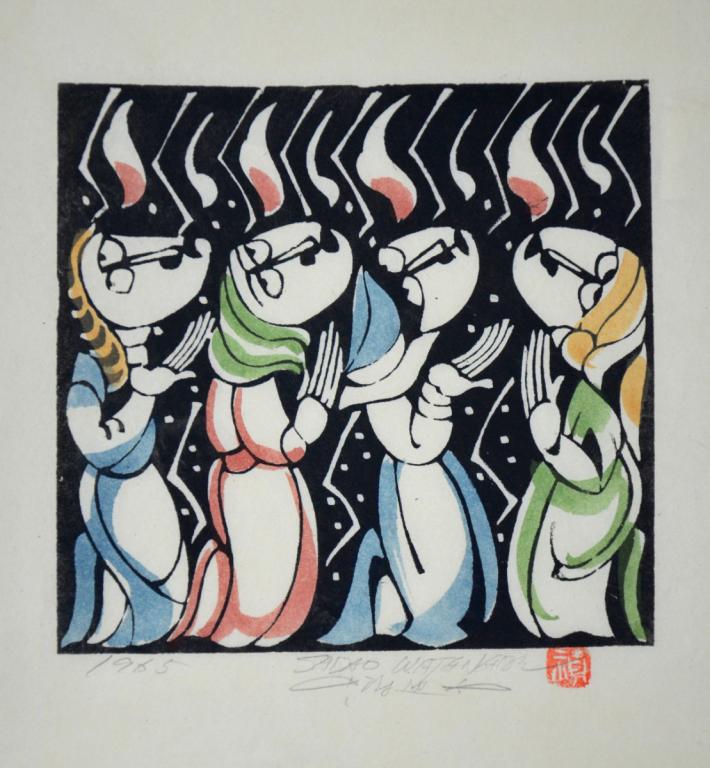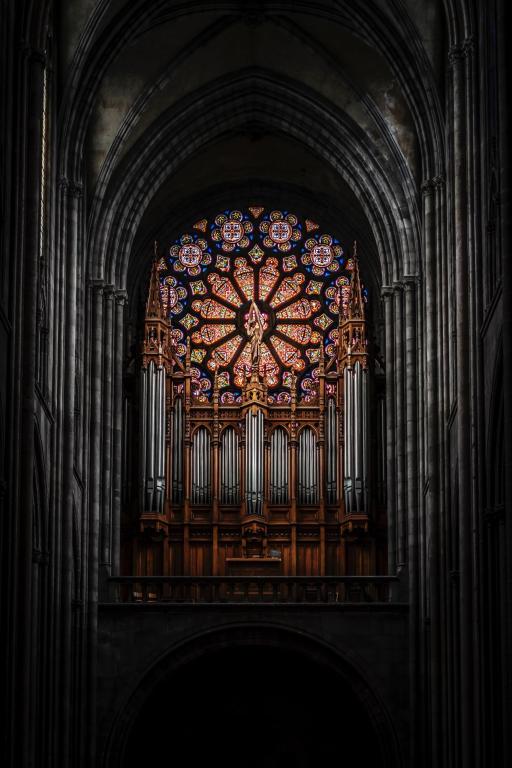Sadao Watanabe (1913-1996)
When the day of Pentecost had come, the disciples were all together in one place. And suddenly from heaven there came a sound like the rush of a violent wind, and it filled the entire house where they were sitting. Divided tongues, as of fire, appeared among them, and a tongue rested on each of them. All of them were filled with the Holy Spirit and began to speak in other languages, as the Spirit gave them ability.
Now there were devout Jews from every nation under heaven living in Jerusalem. And at this sound the crowd gathered and was bewildered, because each one heard them speaking in the native language of each. Amazed and astonished, they asked, “Are not all these who are speaking Galileans? And how is it that we hear, each of us, in our own native language? Parthians, Medes, Elamites, and residents of Mesopotamia, Judea and Cappadocia, Pontus and Asia, Phrygia and Pamphylia, Egypt and the parts of Libya belonging to Cyrene, and visitors from Rome, both Jews and proselytes, Cretans and Arabs– in our own languages we hear them speaking about God’s deeds of power.” All were amazed and perplexed, saying to one another, “What does this mean?” But others sneered and said, “They are filled with new wine.”
But Peter, standing with the eleven, raised his voice and addressed them, “Men of Judea and all who live in Jerusalem, let this be known to you, and listen to what I say. Indeed, these are not drunk, as you suppose, for it is only nine o’clock in the morning. No, this is what was spoken through the prophet Joel:
`In the last days it will be, God declares,
that I will pour out my Spirit upon all flesh,
and your sons and your daughters shall prophesy,and your young men shall see visions,
and your old men shall dream dreams.Even upon my slaves, both men and women,
in those days I will pour out my Spirit;
and they shall prophesy.And I will show portents in the heaven above
and signs on the earth below,
blood, and fire, and smoky mist.The sun shall be turned to darkness
and the moon to blood,
before the coming of the Lord’s great and glorious day.Then everyone who calls on the name of the Lord shall be saved.’ ” (Acts 2:1-21)
When I lived in Jerusalem one of my daughter’s closest friends worked in a local hotel on Mount Scopus. The staff was housed on the lower levels of the hotel and given the grade of the land around it, you entered at the top of the hotel, which was shaped like a ziggurat, and the elevator went down, instead of up from the lobby. Inevitably, the two girls played on Saturday and that, of course, is Shabbat in Jerusalem. So, the elevator was rigged to stop at every floor, so that you didn’t need to work on the Sabbath by pushing buttons. I deeply respected the assumptions that shaped this practice. But every time I got on that elevator, I wished that it had a “Gentile” button which would have allowed me to bypass the other floors. Of course, that was not offing.
The technology was based upon a simple view of the world: Jews are Jews, everyone else is a Gentile. That way of thinking about the world is part and parcel of the Jewish consciousness, especially in orthodox Jewish communities where religion remains the major identifier. And that way of thinking about the world dominated ancient Judaism, as well. But ancient Jewish hope also looked forward to a day when their experience of God would be universal, and the will of God – represented by the Law of Moses – would be written on the heart.
Luke is convinced that expectation is now in reach, and with the gift of the Holy Spirit, he believes that God is now delivering on that promise. There is a miracle – not so much of speaking, but of hearing. The flame that lands on those who listen echoes images associated with the giving of the Law in ancient Jewish literature. And the new reality that Luke describes in the Book of Acts touches first Jews from around the world in this passage, then spreads to Gentiles everywhere across the rest of Luke’s story.
The larger story that Acts tells is more complicated than many descriptions of it suggest. Some interpretations of the story talk about “the birth of the church”. Some single out the gift of the Holy Spirit and its manifestation. Still others focus on the breadth and diversity of the people drawn into the event.
But at a deeper level the story is about the fulfillment of an ancient hope: the hope that God’s Spirit would move over his people and possess them, that the Law would be fulfilled and written on their hearts, that their lives would be transformed by their experience, and that this decisive turning point would draw the rest of the world to the God of Israel.
This is undoubtedly why Peter is described as having quoted the prophet, Joel. Joel writes in a day and age when the children of Israel are afraid that their own sin will subject them to God’s judgment. Joel urges them to repent and joins them in that repentance, and he foresees not only an immediate deliverance that will come as a result but a larger, complete deliverance that will eventually come. The people are given over completely to God’s presence and power. They don’t just know the will of God, they embody it, and God’s love and mercy embraces and changes the whole world.
Read carefully and with an eye to its original meaning, then, the story Luke tells is not as simple as we would like:
Is the love of God universal and all-embracing? Yes. And in ways that inevitably make all of us really uncomfortable, sooner or later. My mother gave voice occasionally to a thought that we’ve all had: “It takes all kinds to make the world go ‘round, but it sure would turn a little more easily without some of them.”
Whether it’s thanks to temperament, experience, opinion, socialization, or genetics, we are all more at ease with some people than we are with others. Ultimately that love and embracing mercy led to the cross. If we think that we could be that loving – if we think that we could place ourselves in the hands of people with whom we are uncomfortable – never mind people who would like to have us executed – I am certain that we are fooling ourselves.
But does that mean that God in Christ is without expectations? That God does not require repentance and transformation? No.
You can’t use the teaching of Jesus or the Book of Acts to make that argument. Neither Jesus, nor Luke foresee a future where the will of God as expressed in the Law goes away, and we all do whatever we want to do. They foresee a day when our understanding of God’s will, and the Law will be so immediate that we will embody its intentions.
We won’t ask, “Now what was that again?” We won’t ask, “Are there any loopholes or exceptions?” We won’t ask, “Just how many times do I need to do this?”
And here is the extraordinary claim that both Jesus and Luke make: That day is now. Now, at Pentecost, the Spirit is given. Now, at Pentecost, we are called to live from that power. Now, at Pentecost, we are called to live in obedience to the prompting of God’s will, without equivocation. This means that there is no place for playing the legalist or the libertine, which are the two places we all go so often.
Contrary to our legalistic tendencies: We are not entitled to qualify what God wants, laying out a list of superficial demands that, if fulfilled, will allow us to gate-keep the Kingdom of God. The Christian doesn’t ask, “Would you spell out just what it takes to get an ‘A’” but lives out of the Law as a kind of shorthand for a life given over completely to the healing purposes of God.
But contrary to our libertine tendencies: We aren’t allowed to argue that God doesn’t expect anything either. Nor can we claim that all you need is love, in the amorphous, gauzy way we use that word. God is, indeed, love, but love that is transforming, tough and fibrous. God is the kind of love that doesn’t shrink from darkness and doesn’t bless it – which is why the sermon Jesus preaches on the plain in Luke’s Gospel talks about “blessings” and “curses”, good trees with good fruit and bad trees without fruit, houses built on foundations of rock and houses with no foundations at all.
So where does that leave the church on Pentecost Sunday in the beginning of the third decade of the 21st century?
With a mission:
To give expression to the transforming, tough and fibrous love of God,
A love that leaves us uncomfortable with a world that doesn’t get it and often doesn’t want it,
A love that leaves us uncomfortable with the demands it makes upon us and uncomfortable with saying that it makes demands,
A love that embraces people we often find discomforting.
It also leaves us with joy and a word of hope – which we are not just called to declare, but embody,
In a world that is broken and imploding,
In a world in which our institutions are failing to deal with its needs,
In a world in which the human heart still plainly needs repentance, mercy, love, and direction.
Let us pray for God to guide us, individually and as a community, that we might give that hope and reality fresh expression in our lives.
God of love and the Law, made perfect in the life and teaching of your Son, our Savior, Jesus Christ, descend upon us in the power of your Holy Spirit. Purify our hearts, give us a sense of your presence, a knowledge of your will, and the courage to manifest both in the life of your church, the Body of Christ. Use us to name the dark places in our world, use us to spread the news of your grace, mercy, and love. And bring the Pentecostal power of your presence to bear upon the needs of every man, woman, and child, until that day when we celebrate your redeeming love in all its fullness. Through Christ, our Lord, who with you and the Holy Spirit, reign one God, now and forever. Amen.













